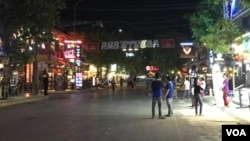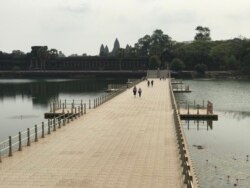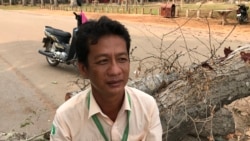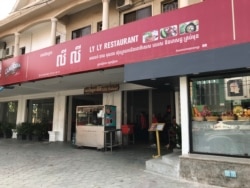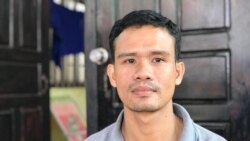Chak Pheap’s papaya salad and cold drinks stall is nestled near the Angkor Wat heritage site in the temple town of Siem Reap. With a strategic location near the ancient temple, Chak Pheap has been able to successfully attract tourists and locals to sample her salad offerings.
But in mid-March, Chak Pheap looked around her small stall, the five towers of the Angkorian temple not far away, and there was almost no one around. There was an eerie silence surrounding the temples.
There were almost no tourists at Angkor Wat nor were tuk tuks ferrying people around the various temples in the archaeological park. The makeshift bridge across the Angkor Wat moat, usually teeming with people taking selfies, was deserted.
The 43-year-old mother of five said she used to earn around $100 a day. But that was before the coronavirus pandemic brought global travel and tourism to a grinding halt.
“On some days, I can’t sell even one bowl,” she said. “For the last 15 days, I couldn’t sell enough to use up one raw papaya fruit.”
Starting in February, the government reported a massive drop in Chinese tourists as the virus gripped parts of the mainland, with Western tourists canceling their travel plans as the epicenter of the pandemic shifted to Europe and the United States.
Cambodia has so far reported 109 confirmed cases, and imposed travel restrictions on foreign visitors to the country, worsening an already bleak situation.
The last two months have seen the tourism sector, as well as informal workers and small family-run businesses, bear the brunt of this virus-induced economic distress.
“But now we get only [$7.50] or [$10] a day. How can we have enough food to eat with that?” said Chak Pheap.
While the lack of income affects Chak Pheap and her children, she is equally concerned about the two loans from microfinance institutions (MFIs) she needs to repay. Some sort of amnesty on payments, for at least a few months, would provide her some relief, she said.
“Then we heard that Samdech [Hun Sen] announced that the banks should delay [payments] for two or three months,” Chak Pheap said.
“The [MFI] organizations said that Samdech Hun Sen just announced it. But if he doesn’t put a stamp on [the paper], what can we do?”
In March, Prime Minister Hun Sen asked MFIs to defer payments or charge zero interest for garment workers because they faced an uncertain future on account of factory suspensions.
“Delay repayments or take no interest,” he said, adding that 50 percent of workers at temporarily shutdown factories were indebted. “And if possible, waiver the interest within the time [the work] is suspended.”
As Chak Pheap said, the announcement had not been finalized in a government directive and was contextually meant for garment workers at the time.
On the pavement outside the Angkor Wat temple, several guides, who would normally be busy recounting the history of the Angkor Empire to tourists, are sitting in a row.
Neng Bunrong, a 42-year-old tourist guide, said he had taken only two tourists around the Angkor complex in March.
At the same time last year, he was able to make at least $20 a day during the low season, which would cover his living expenses. But that was not the case this year.
He was not pleased to be outside his home amid the coronavirus outbreak but had to try to earn some money given his lack of savings.
“Suppose we don’t have money for renting rooms or buying food, how can we not worry? Due to the loss of income shortage, it pushes us to come out [to earn],” he added.
Much like workers in other sectors, Neng Bunrong was worried about repaying his loans, though not detailing the source and amount of his loans.
“Please look at the bridge at the front gate of Angkor Wat, there are almost no guests walking there. So, how will we have money to pay interest?”
Earlier this week, Prime Minister Hun Sen again said banks should allow for delays in loan repayments, even calling on landlords to give tenants some leniency in paying rent.
“Therefore, they should not take this as an opportunity to confiscate their houses,” Hun Sen said on Monday, at a press conference at the National Assembly.
While there has been no official notification on whether loan repayments will be deferred, the National Bank of Cambodia (NBC) asked banks and financial institutions to provide for loan restructuring as a way to provide some relief to borrowers.
Loan restructuring allows for reduction in payments, deferments, and reduction in interest rates, but was an already-existing mechanism available to financial institutions
Also, the National Bank of Cambodia has left it to the board of directors at each institution to decide which borrowers qualified for restructuring, rather than a mandatory policy to help the Cambodian people during the economic downturn.
The directive adds that loan restructuring will be provided to borrowers working in the tourism, garment, construction and transportation sectors, with NBC requiring regular reporting of this process from all financial institutions.
Ministry of Economy and Finance spokespersons Meas Sok Sensan and Kim Sopheak did not respond to multiple phone calls made by VOA reporters.
Heng Koy, general director of the Association of Banks in Cambodia, only pointed to the NBC directive, refusing to comment further. “I think that the government already issued the guidelines to respond to the concerns you mentioned.”
Other financial institutions like Prasac, Acleda Bank, AMK and Cambodia Post Bank did not respond to requests for comment.
Back in Siem Reap town, Soy Chantha, who is a chef, said his monthly salary was slashed by half due to the low number of tourists visiting the Ly Ly Restaurant.
While he has survived an initial downsizing of staff, down to 10 employees from 40, he was worried his current salary of $400 would be cut further, making it hard for him and his wife to repay their loans.
Soy Chantha’s loan is a hefty amount - around $15,000 was borrowed from Cambodia Post Bank to build a new home for his family. And with $320 in monthly payments, the restaurant chef is struggling to make ends meet.
“If I am suspended from my work, I will have no money to back the bank,” he said. “I just need to earn enough to feed myself.”




